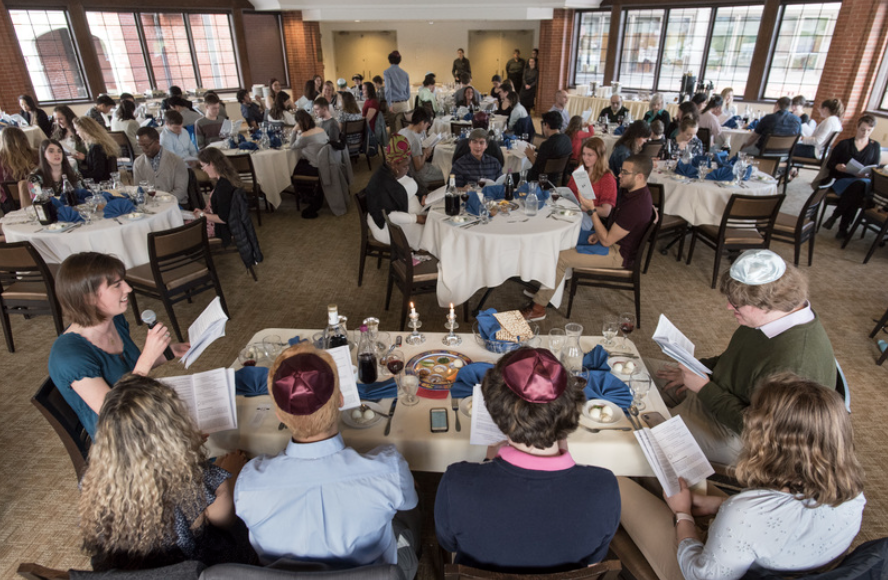
By Veronica Brinkley
In the five months since the Israel-Hamas war began, antisemitism in the US has skyrocketed. Since Oct. 7, the Anti-Defamation League (ADL) recorded 40 incidents of physical assault against Jews, 337 incidents of vandalism, and 749 incidents of verbal or written harassment. All of this was prompted by or directed toward nothing but the victims’ Jewish identity. While these incidents have been inflamed by the conflict, antisemitism has already been on the rise for years. The ADL reported a 36% increase in 2022.
College campuses specifically have been activated by the conflict in the Middle East. At times like this, supporting Jewish students is more important than ever. Most larger universities do this through Hillel International, a Jewish student support organization with chapters at 850 colleges and universities in the United States, Canada, and 16 countries around the world, according to their website. While our University once had a Hillel chapter, it was replaced in favor of a Jewish Student Union. JSU leadership is hard at work doing everything they can to support Jewish students, but our campus lacks the structural support a Hillel chapter would provide.
Dave Wright, the University Chaplain, supports religious clubs on campus. Wright explained the history of the University’s Jewish campus life, beginning in the mid-90’s when he joined the University. “Each structural iteration of student clubs related to Jewish Life has had a similar range of ups and downs, mostly shaped by leadership styles, different emphases for programs and activities,” they said.
In the nineties, the Jewish community was organized under a Jewish Student Organization, similar to the JSU today. In 2006, Jewish students expressed a desire for the development of stronger institutional support, and a part-time Jewish-life coordinator was hired. By 2009, students wanted regular representation, so a Hillel chapter was created to fill this need. According to Wright, “The Hillel connection worked well for several years,” and soon after, two more Jewish student organizations joined our campus. They were J Street U, an organization similar to Hillel, as well as Challah for Hunger, an organization dedicated to ending food insecurity in the US. Wright said J Street U “lasted for maybe 4-5 years, and Challah for Hunger, lasted 1-2 years. Both of those clubs were driven by one or two students with a deep passion, and their leaders were also very involved in Hillel. The brief period where we had the three clubs – Hillel, Challah for Hunger, and J Street U – was definitely a very strong moment for Jewish life at Puget Sound,” he said.
In 2014, Jewish students at Swarthmore College and Vassar College chose to break with Hillel International over its support for Israel. Jewish students at Puget Sound began discussing how best to move forward with the same concerns in mind. Ultimately, they reorganized into a single homogeneous organization, the Jewish Student Union we have today. “It was entirely a student decision, led by elected leadership,” Dave said. “The leadership chose to reorganize as our Jewish Student Union, with the idea at the time being that this would be a more inclusive umbrella that could support a range of expressions of Judaism.”
Nate Sansone and Emma Kleiff are members of JSU’s current executive board. Sansone explains that this year, JSU is trying something a little different. “We’re trying out a community-based model this year. Seven of us help lead JSU, and we’re all co-presidents, so the executive team is explicitly leaderless. We meet weekly to identify what we need to accomplish in the coming week and divide responsibilities according to people’s workloads; the work we do individually for the club varies,” he said. With this model, JSU strives to provide the best support to this community as possible, especially during difficult times like these. While one school, especially a small one, cannot replace the network of staff and resources that Hillel offered, Sansone said that there are many upsides to having JSU instead. “We do our best to support a broad range of expressions of Judaism. Jewish students have diverse views, including on how they understand and want to express their Jewishness.”
But the University could do more to support Jewish student life.“A Jewish life coordinator or position similarly centered on supporting Jewish students would be very beneficial,” Sansone said. Wright explains that the Chaplaincy, Student Affairs, and the Office of Institutional Equity and Diversity work with JSU to try to address student needs. Our campus in particular has struggled with a pattern of antisemetic incidents in recent years. “I hope the University will continue to work to address our chronic challenges with antisemitic vandalism and rhetoric,” Wright said. According to him, the University could also do a better job of tracking non-Christian holidays.
Wright also said that the best way to address these issues would be the re-implementation of a Jewish life coordinator position, echoing the sentiment of JSU leadership. However, Kleiff adds, “I personally think that the school is doing the best that they can in terms of outreach and support, and I think their actions are well intended.”
It’s unlikely our campus will affiliate with Hillel again anytime soon, though Wright says it’s possible if enough students want it. Acknowledging the stress and anxiety Jewish students are expressing would be a step in the right direction. The addition of a Jewish-life coordinator could act as a bridge between the students’ needs and the University’s abilities. Jewish students on our campus deserve social and emotional support, now more than ever.
